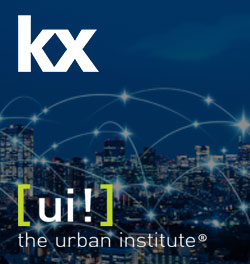
Kx to power global Smart Cities with Urban Institute
– Rollout to start in the Australian cities of Brisbane and Darwin –
(27 February 2019) Kx is set to power the next generation of smart cities, enabling operational intelligence to be embedded into vital infrastructure such as road, water, phone and power systems. Kx will enable the Urban Institute’s smart data analytics platform, UrbanPulse, to process and analyze rapidly-growing data volumes in real-time to deliver infrastructure benefits that are critical to the health of modern cities and their residents.
With Smart City spending expected to reach $158 billion by 2022 (IDC), the Urban Institute provides technology that is instrumental in delivering the smart cities of the future. The aim is to deliver benefits such as better traffic management through the use of radar and WiFi mesh systems to control traffic light settings. However, to fulfil this vision, councils need a way to access, analyze and act on the data while maintaining necessary attributes such as security and privacy. The UrbanPulse data platform currently addresses these challenges for a variety of clients, ranging from government partners to energy providers across Europe, Australia and the United States.
As the digital infrastructure within cities grows, so do data volumes and complexity, rendering existing technologies increasingly unable to cope with the challenge of turning data into actions. Using Kx technology, the Urban Institute is able to deliver a next-generation solution to its clients, optimized to handle massive quantities of sensor data coming from multiple sources. Kx technology is perfectly suited to address the smart city data challenges, enabling city officials to engage with and explore their data. Optimized for scalability and adaptability, the Kx technology stack enables access to data and actionable intelligence in real time.
With the enhanced speed and power that Kx brings, UrbanPulse has already been deployed in major Australian cities such as Darwin and Brisbane with a plan of four more cities by mid-2019.
Simon Kaplan, CEO of [ui!] The Urban Institute, commented: “With over 70% of the world’s population now living in urban areas, smart, connected cities are needed now more than ever. Kx technology has allowed us to significantly enhance our sensor analytics capabilities and deliver actionable insights to the cities we are working with.”
Brian Conlon, CEO of Kx, commented: “As Smart Cities evolve, the data volumes they generate will continue to skyrocket. Powered by Kx, the Urban Institute is able to scale its innovative UrbanPulse platform to meet this challenge and deliver real-world benefits. This exciting use of Kx technology further demonstrates the value it provides in real-time sensor analytics.”
About Kx
Kx is a division of First Derivatives (FDP.L), a global technology provider with 20 years of experience working with some of the world’s largest finance, technology, retail, pharma, manufacturing and energy institutions. Kx technology, incorporating the kdb+ time-series database, is a leader in high-performance, in-memory computing, streaming analytics and operational intelligence. Kx delivers the best possible performance and flexibility for high-volume, data-intensive analytics and applications across multiple industries. The Group operates from 14 offices across Europe, North America and Asia Pacific, including its headquarters in Newry, and employs more than 2,400 people worldwide.
For more information about Kx please visit www.kx.com. For general enquiries, write to info@kx.com. For press inquiries, write to pr@kx.com.
About [ui!] The Urban Institute Pty Ltd
[ui!] The Urban Institute Pty Ltd was founded in 2015 in Australia by Lutz Heuser and Simon Kaplan. Together, they brought over 40 years’ experience in building innovative software systems to the problem of delivering open, real-time analytics at massive scale, together with powerful visualisations and insights for cities. With over 30 cities worldwide using the UrbanPulse, [ui!] is well positioned to take up a dominant place in the emerging smart cities market.


